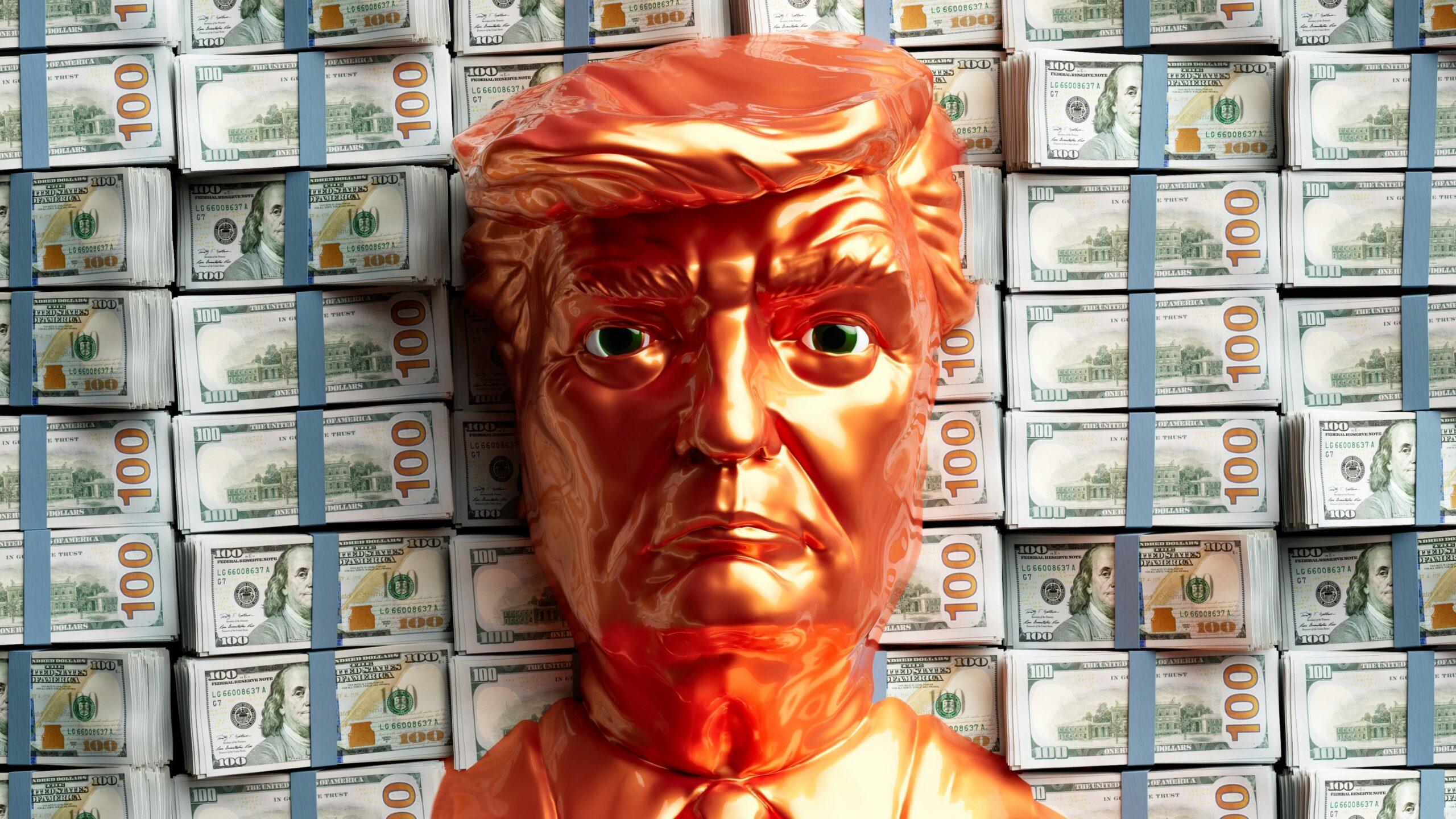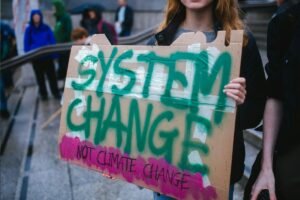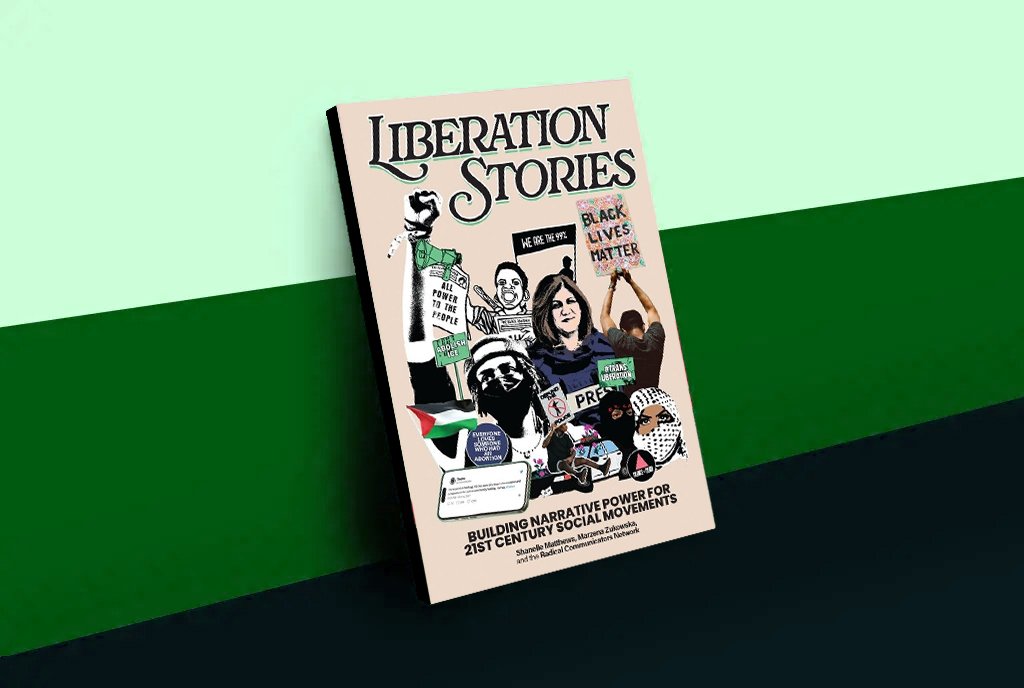
In February 2025, Citizens for Responsibility and Ethics in Washington (CREW) released a report investigating what it called the “unprecedented corruption” of the Donald Trump administration. As Rebecca Jacobs, a research associate at CREW, wrote, “The most corrupt president of all time is back in office with a slew of new conflicts of interest.”
Corruption, of course, is not new to US politics. From Watergate to the Iran-Contra affair, American history is riddled with examples of public officials exploiting their positions. As Kristen Drybread, coeditor of Corruption and Illiberal Politics in the Trump Era, explained to NPQ, the history of accumulation of wealth by career politicians—many of whom have become millionaires while in office—suggests that such abuses long predate Trump.
But what is new is the brazenness.
Rather than being concealed, corruption under Trump is overt, performative, and, in many cases, legally sanctioned by far-right courts. Unsurprisingly, this is all part of a larger strategy, alongside Trump’s authoritarian spectacle, to reshape the legal and political landscape. The more gifts (like the $400 million plane Qatar donated to act as Air Force One) or lavish expenses (such as Trump’s $148 million meme coin dinner), the more democratic norms erode and allow Trump and other oligarchs to profit from their public positions.
This leaves grassroots organizations and nonprofits as a critical bastion of resistance for civil society—and offers the opportunity to develop new strategies and systems of care that center the many rather than the few.
What Is “Corruption” Exactly?
While the term “corruption” is often invoked to describe the erosion of democratic norms, its legal definition remains strikingly narrow.
“Corruption does not necessarily align with what is illegal,” Danielle Brian, the executive director and president of the nonprofit Project On Government Oversight (POGO) told NPQ.
“That doesn’t mean it’s not corruption. It just means our systems are not meeting the moment.”
“There are many things that we have in our culture before Trump was reelected that were corrupt but legal,” she noted, pointing to campaign finance loopholes, lawmakers’ ability to trade stocks, and the exemption of the president and vice president from certain ethics rules as examples of practices that may be lawful but are deeply unethical.
“That doesn’t mean it’s not corruption. It just means our systems are not meeting the moment,” she explained. “Corruption is the abuse of political power for private gain. It doesn’t necessarily mean financial gain. Sometimes what we’re seeing happen is someone using their political power to just advance their power.”
Trump’s Overt Corruption
Historically, officials sought to obscure corrupt acts to avoid public outrage or legal consequences. Trump, by contrast, seems to embrace the inadequacy of the law as part of his political brand. Since taking office, Trump’s actions—particularly those made for his own personal gain—are thinly veiled, at best. If corruption in his first term was a whisper, this time it’s a bombastic shout.
“Trump’s been able to get away with visible corruption because he doesn’t try to hide it….Instead, he recasts his self-dealing, dishonesty, and abuse as proof that he’s powerful, successful, and not a chump,” Drybread said.
This performance of power is not incidental but strategic. Visible corruption functions as a transitional mechanism—eroding democratic norms, normalizing impunity, and paving the way for authoritarian control.
“In an era where politics has become increasingly mediatized, Trump’s spectacles…constitute a performative governance style rooted in authoritarian populism,” Peter Bloom, professor of Management at the University of Essex, told NPQ.
For the nonprofit sector, this shift poses an existential threat since many organizations rely on the rule of law, transparency, and public accountability to carry out their missions. But now, these democratic foundations are being actively dismantled.
Indeed, the Trump administration has increasingly used corrupt—and likely unlawful—means to undermine nonprofits: slashing federal funding, attempting to consolidate control over independent organizations, and threatening the tax-exempt status of groups that challenge its policies.
As Chioma Chukwu, interim executive director of nonpartisan watchdog organization American Oversight, explained to NPQ, “When rule-breaking becomes commonplace and consequences disappear, the public’s sense of outrage dulls. This desensitization makes it easier for antidemocratic behavior to take root and spread, normalizing abuses that would have once triggered alarm.”
When Corruption Becomes Law
Legal redefinitions of corruption have not only failed to constrain Trump’s executive overreach—they’ve helped legitimize it. In McDonnell v. United States (2016), the US Supreme Court significantly narrowed the federal definition of corruption, limiting it to explicit quid pro quo arrangements involving specific “official acts.” As a result, gifts, privileged access, and blatant favoritism often escape legal scrutiny.
“When rule-breaking becomes commonplace and consequences disappear, the public’s sense of outrage dulls.”
And the narrowing of corruption laws has emboldened political actors to blur ethical lines under the guise of legality, enabling Trump to defy ethical norms openly.
As Chukwu noted, “Corruption—especially when committed openly—operates as a show of dominance. It signals to the public that those in power are above the law, while simultaneously discouraging dissent by undermining faith in accountability. Authoritarian regimes often use this visibility strategically: not to hide misconduct but to flaunt it.”
While this flaunting of misconduct was evident from the start of his first administration, as Brian noted, taking office and “publicly exploiting our weak corruption laws as they apply to the presidency” in Trump’s second term has only intensified.
What Nonprofits Must Do Now
As visible corruption becomes a governing strategy, nonprofits must adapt. The illusion that “business as usual” still applies has evaporated in today’s political environment, one in which accountability is deliberately undermined, oversight is hollowed out, and spectacle replaces substance.
The nonprofit sector must not only defend democratic norms but take up the mantle of actively rebuilding them. As Chukwu said, “This is a moment that demands vigilance, strategic litigation, and storytelling.”
Drawing on interviews with watchdog leaders, scholars, and accountability experts, here are six key strategies nonprofit leaders must consider in responding to this authoritarian moment:
-
Document Relentlessly—Even Without Immediate Recourse.
A clear, factual record is the foundation of future accountability. Even when courts falter or watchdog agencies are defunded, documentation preserves the truth and lays the groundwork for legal, journalistic, or public reckoning.
Sign up for our free newsletters
Subscribe to NPQ's newsletters to have our top stories delivered directly to your inbox.
By signing up, you agree to our privacy policy and terms of use, and to receive messages from NPQ and our partners.
“Watchdog groups must pay closer attention to systematic efforts to deny public access to government records—a foundational step in the authoritarian playbook,” Chukwu told NPQ. “By framing access to truth not as a bureaucratic procedure but as a fundamental democratic right, we can help citizens understand what’s at stake and mobilize more effective resistance before these patterns become normalized and irreversible.”
Even as the Trump administration gutted the staffing and infrastructure of key federal agencies, obstructed records requests, and attempted to shield entire offices—such as DOGE—from Freedom of Information Act (FOIA) oversight, nonprofits must continue tracking government misconduct, regulatory rollbacks, and FOIA obstructions.
“The key lesson: documentation is power,” Chukwu said.
-
Reframe Corruption as a Democratic Emergency.
As we well know, corruption today is overt, performative, and systemic. Yet it’s too often framed as a technical or ethical issue rather than a democratic crisis.
“Effective campaigns must translate systemic misconduct into clear, moral terms that mobilize people, linking abuses of power to harms that communities understand, like public health, economic justice, and civil rights,” Chukwu told NPQ.
Nonprofits can help reframe corruption by connecting institutional erosion to tangible harms such as unsafe housing, polluted water, voter suppression, and defunded schools.
“Watchdog groups must track and expose efforts to suppress dissent, subvert oversight, and politicize the justice system….Simultaneously, we must amplify the stories of those who have been harmed, connecting legal analysis to their lived experiences,” Chukwu explained. “Democracy doesn’t erode in the abstract; it erodes in courtrooms, cabinet meetings, and executive memos. Our job is to bring that into the light and keep government officials from shrouding their work in secrecy or illegally covering their tracks.”
By grounding abstract principles in everyday consequences, nonprofits can mobilize public concern and reengage communities.
“Democracy doesn’t erode in the abstract; it erodes in courtrooms, cabinet meetings, and executive memos.”
-
Build Narrative Power to Counter Spectacle.
Trump’s dominance stems not just from policy but from narrative control. Spectacle is part of the strategy—and the nonprofit sector must reclaim the power of storytelling.
“Narratives that humanize the consequences of corruption and show how legal manipulation affects everyday life can reenergize civic engagement and resistance,” Chukwu said.
“We need to tell better stories,” added Drybread and pointed to The OpEd Project, a nonprofit that works to amplify the voices of those often excluded from public discourse, including nonprofit leaders and underrepresented thinkers. Rooted in the belief that “the story we tell becomes the world we live in,” the organization trains individuals to step into thought leadership roles and helps shift who gets heard in public conversations.
“I think nonprofits need to make themselves publicly visible as the heroic figures they often are. The public is so often unaware of the amazing and important work nonprofits do because such work rarely brings fame or riches,” Drybread continued. “They can write op-eds, publicize their work on Tik Tok, find ways to reach people and tell their stories.”
-
Build Cross-Sector Solidarity and Collective Infrastructure.
In this political climate, no organization can stand alone. Leaders emphasize the growing need for collective legal support, cybersecurity, communications strategies, and rapid response infrastructure.
“One thing I think is really great is that our community is proactively coming together. There are a variety of spaces where those of us leading organizations are connecting across the sector, recognizing that when one member of our community is being threatened—[when] our First Amendment rights to do this work [are at risk]—it impacts all of us,” Brian told NPQ.
Brian notes that early fragmentation among universities and law firms left the sector vulnerable. But as collaboration increased, so did their resilience. What has been especially helpful is sharing resources, legal strategies, and advice on how to set ourselves up for success.
-
Prepare for 24-Hour Communications Cycles.
In a media landscape driven by speed and spectacle, real-time response is essential. Nonprofits must train staff in crisis communications, form rapid response teams, and build relationships with journalists before the next headline breaks.
“We’re also very focused on the rumors of executive orders targeting our sector—and it’s very realistic given the executive orders that we’ve already seen. We’re very much on a rapid response,” Brian explained. “We’ve actually brought on a PR firm to help us with rapid response communications because we think it’s really important to get ahead of the narrative and what is happening every day.”
She added, “The velocity of the news cycle is breathtaking, and it’s more than any single organization that works on corruption can handle with the staff that we have. I think that that’s an important thing to recognize: In the end, especially when we look at how other countries have survived authoritarian threats, it is the voice of civil society.”
-
Advance a Vision Beyond Resistance.
Finally, experts note that corruption today is not only about personal gain—it reflects the emergence of what Bloom calls the “authoritarian-financial complex”: a fusion of state power and private capital that thrives on crisis, insecurity, and privatization.
“The logic of this system is recursive: It produces crises that it then claims to solve through mechanisms of surveillance, austerity, and top-down intervention,” Bloom told NPQ.
“Political imagination is trapped within the closed loop of technocratic solutions and strongman fantasies,” he continued, “where progress is synonymous with executive decisiveness, where public safety is conflated with control, and where prosperity is imaginable only through market compliance.”
Nonprofits must counter this not only by resisting repression but by modeling different systems of care, ownership, and governance, he explained. That includes (but is not limited to):
-
- Commons-based resource stewardship
- Participatory budgeting and local democracy
- Collective ownership of housing, food, and energy
- Mutual aid, cooperative economies, and narrative repair
- Definitions of wealth based on interdependence, not accumulation
“The real danger here is not just repression—it is the foreclosure of alternatives,” Bloom told NPQ. The nonprofit sector must become more than a service provider; it must become a site of democratic imagination—an engine for new forms of public life and collective power.
“If there is one question that should be asked more urgently,” Bloom posited, “it is this: What would it look like to build a world where freedom does not require force, where prosperity does not require profit, and where leadership does not require submission?”










